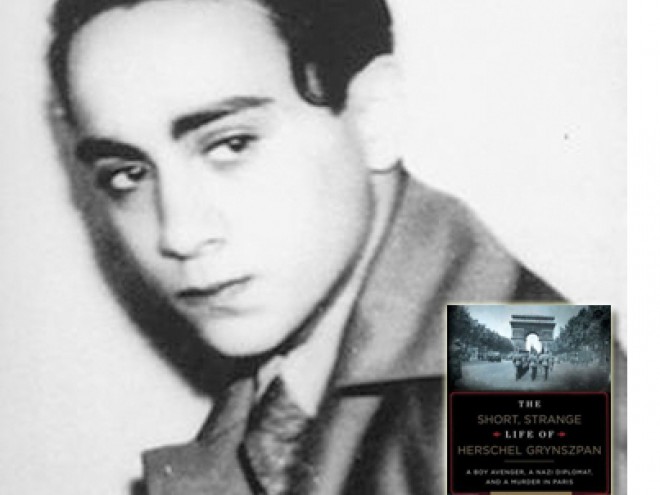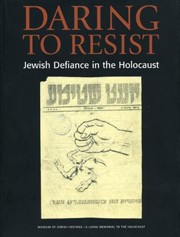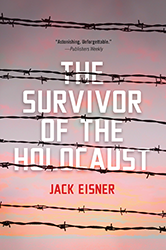One of the most common assumptions about the Holocaust is that Jews did not actively or effectively resist their own extermination; that they often were passive and occasionally complicit in the face of death. The noted scholar Raul Hilberg, for example, wrote about an almost complete lack of resistance, and Hannah Arendt claimed that the Nazis depended on the cooperation of the Judenräte (Jewish Councils) and the Jewish police to administer the “final solution.” Political scientist Benjamin Ginsberg challenges these assumptions, broadens the meaning and scope of resistance, and convincingly argues that the Jews not only resisted the Germans but actually played a major role in defeating Nazi Germany.
If resistance is narrowly defined and situated in ghettos and concentration camps, then obviously Jewish resistance was doomed to failure: desperate and unarmed Jews in Eastern European villages, ghettos, and death camps hardly had the means to resist, yet they often fought bravely in a losing effort and ironically were accused of passivity in situations where no one could have resisted. But ghettos and concentration camps are not the correct places to look for effective resistance. If you broaden the definition and scope of resistance, Ginsberg argues, then Jews responded quite vigorously and effectively, contributing significantly to the defeat of Hitler.
Ginsberg finds that Jewish resistance manifested in four different areas. First, Jews served with distinction as members of the Soviet army, as officers and enlisted men, and as engineers who designed and built many of the pivotal Soviet weapons — including the T‑34 tank, the Katyusha rocket, and the MiG‑3 fighter plane. Second, they made vital contributions to the Allies — the Soviet Union, the United States, and Great Britain — in the fields of espionage and intelligence, particularly cryptanalysis. (In fact, the term “cryptanalysis” was coined by America’s foremost analyst, William Friedman. Friedman’s heavily Jewish group at the US Army’s Signals Intelligence Service, predecessor of today’s NSA, pioneered modern code breaking.) Third, many Jews served in the United States military forces and served as advisers to President Roosevelt, assisting him in his efforts to weaken the isolationist sentiments domestically and prepare for war. Finally, Jews played important roles in several of the major European anti-Nazi resistance movements, particularly in Poland, Greece, and Yugoslavia. Partisan warfare did not defeat the Nazis, but it did hasten their defeat: it may have been responsible for killing as many as 50,000 German troops and disrupting fragile military supply lines.
This is an important book that presents original challenges to the myth of Jewish passivity. There are some aspects of Ginsberg’s analysis and assumptions that one could quarrel with: the characterization of Jewish resistance, for example, as a form of cumulative rather than collective action consisting of disparate groups, individuals, and organizations in different countries channeled by a common threat is problematic. Did nuclear scientists or Soviet generals and engineers of Jewish background do their work or assume leadership because they were Jews, or were they motivated by national, scientific, or other interests? Ginsberg seems to imply that because they were Jews responding to the Nazis it is enough to think of them as “the Jews” reacting in a communal fashion. He also includes a lengthy afterward section comprising of more than twenty-five percent of the book that explores issues like anti-Semitism and the American Left, black anti-Semitism, Islamic anti-Semitism and Jewish self-loathing that have nothing to do with the premise of the book. These issues aside, How the Jews Defeated Hitler makes for compelling reading; it provides a needed corrective to the myth of Jewish passivity, and it will transform how scholars and the informed public view Jews and the Holocaust.
Related Content:
- Beyond Courage: The Untold Story of Jewish Resistance During the Holocaust by Doreen Rappaport
- Jewish Resistance in Wartime Greece by Steven Bowman
- The Minsk Ghetto, 1941 – 1943: Jewish Resistance and Soviet Internationalism by Barbara Epstein
- Twice Dead: Moshe Y. Lubling, The Ethics of Memory, and the Treblinka Revolt by Yoram Lubling
- Who Shall Live: The Wilhelm Bachner Story by Samuel Oliner and Kathleen Lee
- Until Our Last Breath: A Holocaust Story of Love and Partisan Resistance by Michael Bart and Laurel Corona




